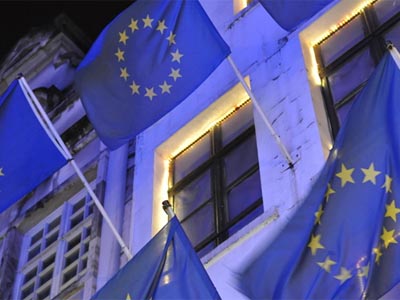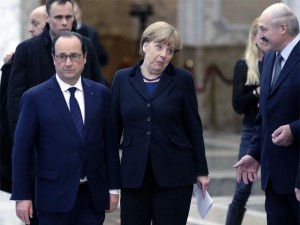Poland and Germany were both initiators and drivers of a New Eastern policy linked to the Eastern neighborhood and Russia/Soviet Union.
Andrei Yahorau: EU has no idea what to do with Belarus

“Interim Phase” is the first serious step in renovating EU-Belarus dialog that has happened over the last four years.
Last week Dirk Schuebel, the Head of the Eastern Partnership Bilateral Division in the European External Action Service (EEAS), said that European Union and Belarus are ready to launch “Interim Phase” of cooperation — a new format of dialog that involves civil society. According to him, the parties want to analyze how they can “team up for modernization of Belarus”.
Andrei Yahorau, the Director of Centre for European Transformation, in the interview with the EuroBelarus Information Service, explained the crux of the new initiative.
— What is the essence of the “Interim Phase” between EU and Belarus, which was announced by Dirk Schuebel, the Head of the Eastern Partnership Bilateral Division in the European External Action Service (EEAS)?
— “Interim Phase” is the process of negotiations between EU and Belarusan authorities regarding the future legal phase of cooperation.
After the Eastern Partnership Summit in Vilnius relations between the EU and Belarusan authorities have somewhat improved, and now the parties try to agree on the format of their future relations. Still, European Union insists on the release of political prisoners as a condition for real cooperation.
For now it is hard to say what will be included in the construction of such dialog; it might be the updated version of “Conjoint Interim Phase”, which was prepared at the time of the previous thaw in 2010. Former document served as a substitution for the so-called Action Plans, which regulated relations with the countries who signed the Agreement son cooperation with the EU. Belarus didn’t sign such agreement; thus, cooperation with the EU remained unsettled. From the political point of view, “Interim Phase” is the first serious step in renovating dialog between EU and Belarus over the last four years. It is not a full-fledged dialog, but rather negotiations about the future actions of the two parties in case such dialog is resumed.
— “The visit of Dirk Schuebel, the Head of the EaP Bilateral Division in EEAS, was unexpected and rather queer, especially with the events unfolding in Ukraine. It seems that he offers Minsk to develop relations with the dictatorship,” stated Andrei Sannikau, politician and former presidential candidate at the 2010 presidential election in Belarus. A lot of Belarusans share his viewpoint. Is it possible that the EU repeats the mistake it made in 2010?
— If the EU doesn’t consider the mistakes in its policy towards the countries-members of the EaP as well as current situation in Ukraine and doesn’t stop building relations exclusively with the states, emphasizing institutional relations with the governments, signing agreements, then it will certainly be repeating its own mistakes.
— In March, during the visit of Gunnar Wiegand, the EEAS Director for Russia, Eastern Partnership, Central Asia Regional Cooperation and OSCE Countries and Jean-Luc Demarty, the Director-General for Tradeof the European Commission, the “Interim Phase” will be launched. Will it replace European Dialog on Modernization (EDoM)?
— No, it won’t. These are parallel processes; and they are likely not to correlate with each other. European Dialog on Modernization will remain a consultant and expert area for preparing draft reforms, whereas its political constituent will be transferred to the format of “Interim Phase”.
— What is your assessment of EDoM?
— The results are very poor: some improvements in the sphere of dialog on Bologna Process, some suggestions of reforms... Still, EDoM hasn’t turned into the area where the dialog between public and political forces, between the state and the EU about the future of the country is taking place. The political part of the dialog was brought to nothing, and we couldn’t have expected more form the expert dialog.
— The EU introduces still new forms of cooperation with Belarus. All this suggests that the EU doesn’t have a holistic approach to the possible ways of cooperation with “the last dictatorship in Europe”. Are full-scale relations at all possible, considering the fact that Belarusan authorities haven’t fulfilled the main demand of the EU, i.e. haven’t freed the political prisoners?
— Indeed, EU has no idea what to do with Belarus. EU policy is contradicting, inconsistent and far from being efficient. Firm stance of the EU on political prisoners has always been correct, as well as making the release of political prisoners the condition for the full-scale dialog. If the EU abandons its stance and develops cooperation with the Belarusan authorities in spite of the political prisoners, it will break any faith in European foreign politics.
Others
-
Uladzimir Matskevich: The sooner the "Union State" is denounced, the better for Belarus
Not only does the “Union State” undermine the establishment of civilized relations with Europe, but it hinders the possibility of normal relations between Belarus and Russia.
-
Uladzimir Matskevich: The regime can no longer control the situation in the country
The authorities are unable to prolong the social contract with the people: there is no way out of the social crisis.
-
Press release of the BNP in connection with the next round of the dialogue in the format of the EU-Belarus Coordination Group
Belarusan National Platform of the Eastern Partnership Civil Society Forum welcomes the dialogue process in the format of the EU-Belarus Coordination Group, the third round of which was held in Minsk on 3-4 April 2017.
-
Hennadiy Maksak: Europe must react adequately to the events in Minsk
A new wave of political repressions should make the EU return to tougher policy towards the Belarusan regime.








Comments
From farewell to a new Eastern policy and towards a new development
Poland and Germany were both initiators and drivers of a New Eastern policy linked to the Eastern neighborhood and Russia/Soviet Union.